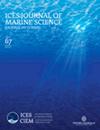Adaptive small-scale fisheries in the eastern Cantabrian coast through reliance on essential species
IF 3.4
2区 农林科学
Q1 FISHERIES
引用次数: 0
Abstract
In recent decades, small-scale fisheries (SSF) activity along the Basque coast (eastern Cantabrian) has declined, which has led remaining vessels to undergo notable shifts in their targeted species and therefore the fishing gears used, aimed at enhancing efficiency. Within that context, this study combines logbooks and sales notes spanning from 1995 to 2022 to assess inter-annual and seasonal variations in fishing activity and the main target species across different fishing gears, namely ‘fleet segments’. Results reveal that the spring Atlantic mackerel (Scomber scombrus) and summer albacore (Thunnus alalunga) seasons, with an intensified harvesting under favourable conditions during the past decade, affected the activity of all other segments throughout the year. In the face of climate change affecting harvested species, a scenario where mackerel and/or albacore seasons are disturbed would lead the SSF to predominantly depend on European hake, mainly caught by declining longlines and set nets, as well as on complementary species. Assessing essential species targeted by each SSF segment relies on is crucial for stakeholders as it helps manage interactions between fleets targeting the same species (e.g. SSF vs. industrial and recreational fisheries), and understand gear shifts by vessels targeting specific species in certain seasons.坎塔布里亚东部沿海依靠重要物种进行适应性小规模捕鱼
近几十年来,巴斯克沿岸(坎塔布连东部)的小型渔业(SSF)活动有所减少,这导致剩余渔船的目标鱼种发生了明显变化,因此使用的渔具也发生了变化,目的是提高效率。在此背景下,本研究结合 1995 年至 2022 年的航海日志和销售记录,评估不同渔具(即 "船队分段")捕捞活动和主要目标鱼种的年际和季节变化。结果显示,春季大西洋鲭(Scomber scombrus)和夏季长鳍金枪鱼(Thunnus alalunga)捕捞季节在过去十年的有利条件下加强了捕捞,影响了全年所有其他分段的捕捞活动。在气候变化影响捕捞物种的情况下,如果青花鱼和/或长鳍鳕的捕捞季节受到干扰,将导致 SSF 主要依赖欧洲无须鳕(主要通过衰退的延绳钓和定置网捕捞)以及补充物种。评估 SSF 各部分所依赖的主要目标鱼种对利益相关者至关重要,因为这有助于管理以相同鱼种为目标的船队之间的相互作用(如 SSF 与工业和休闲渔业),并了解在某些季节以特定鱼种为目标的渔船的渔具转移。
本文章由计算机程序翻译,如有差异,请以英文原文为准。
求助全文
约1分钟内获得全文
求助全文
来源期刊

ICES Journal of Marine Science
农林科学-海洋学
CiteScore
6.60
自引率
12.10%
发文量
207
审稿时长
6-16 weeks
期刊介绍:
The ICES Journal of Marine Science publishes original articles, opinion essays (“Food for Thought”), visions for the future (“Quo Vadimus”), and critical reviews that contribute to our scientific understanding of marine systems and the impact of human activities on them. The Journal also serves as a foundation for scientific advice across the broad spectrum of management and conservation issues related to the marine environment. Oceanography (e.g. productivity-determining processes), marine habitats, living resources, and related topics constitute the key elements of papers considered for publication. This includes economic, social, and public administration studies to the extent that they are directly related to management of the seas and are of general interest to marine scientists. Integrated studies that bridge gaps between traditional disciplines are particularly welcome.
 求助内容:
求助内容: 应助结果提醒方式:
应助结果提醒方式:


